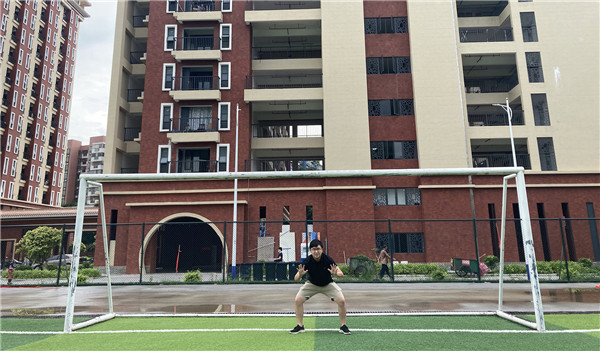“生地”“熟地”
[新加坡]袁梓朗 广州中医药大学

2012年,我从新加坡来到岭南千年商都广州追寻我的中医梦,一出机场看到这陌生的土地,听到周围充满广东话与普通话的交流,感受着这既熟悉又陌生的人文,不禁叹道:“生地!”我从小受到家人的熏陶而对中医学有浓厚的兴趣并从小受到广东文化的影响,广东气候与生活和新加坡较相似,所以我选择到中国广州中医药大学学习最正宗、最专业、临床疗效最优的中医。
早已耳闻广州不单单商业发达,还是座充满着大大小小的美食的城市,正所谓“食在广州”,对于我这位新加坡大吃货甚是美哉。本科阶段认识不少广东本地的同学,课余时间他们带着我吃遍“陈添记”“超记”“陶陶居”“惠食佳”等,早茶、肠粉、煲仔饭、啫啫煲,凡所应有无所不有。在广州,大街小巷都能看到不少凉茶铺与卖药材的店,作为中医学生的我为此非常兴奋,总是闻闻与尝尝店铺里各种药材的味道,感受它们的四气五味,想象它们如何在人体里运行归经。除此之外,我还参加很多学校的社团以及比赛,认识了许多来自五湖四海的朋友,让我知道了中国各地一些不同的人文风情,因此有了到各地探索的心。在各地旅游中也出现过不少插曲,如在昆明出租车上不见了行李,除了同学帮忙,当地的警察也非常热心地帮我调取监控找到出租车并拿回衣服,当时心里感觉暖流不断徘徊。

袁梓朗在学校足球场
本科期间,发现手机在日常生活中变得越来越重要。特别有感触的是,微信在大一的时候还只是一个聊天软件而已,到大三后就变成我们不可缺少的移动支付工具,围绕着我们的衣食住行,可谓“机不可失”。新加坡的朋友来到中国找我玩,看着我扫一个个二维码,以为我在扫什么优惠,想不到我在付款,这让他们感觉自己貌似“乡巴佬”。还记得我们新加坡总理李显龙也在国庆群众大会说道:“中国是世界上移动支付最先进的国家。”中国有太多东西值得我学习,因此我选择继续在中国攻读硕士博士。这一方面能加深我的理论知识与临床能力,另一方面我希望有更多的时间好好认识中国,开阔我的视野。五年一晃而过,校园的每一个角落,上下课的路上,一个个掉落的杧果,一张张熟悉的面孔,像一个个镜头在脑海中闪过,感觉自己也慢慢“熟了”,不知不觉对广中医产生了家一样的感觉。
研究生阶段我把更多的时间投入到专业知识与临床能力的提升中。三年来跟着导师学习,不但在导师身上学到知识与技术,并且受到他高尚品德的熏陶。让我深刻地明白我们在治疗检查疾病时,获得的可能是八纲脏腑六经、解剖学、病理生理学方面的东西;在治疗检查人时,我们获得的是生活与生命。在临床上接触的患者大多是广东人,幸好新加坡是多语言国家,而我家也有讲粤语,在沟通上还是没难度,这让我拉近了与患者距离。
从中药炮制学我们知道生地需要经过九蒸九晒方能成为熟地。今年也是我来广州中医药大学的第九年,经过九年熏陶学习,由开始感觉的“生地”变为如今的“熟地”。非常感恩这片熟地为我养血滋阴与补精益髓,让我在漫漫人生路上走得那么扎实。
From Shengdi to Shudi
[Singapore] Yuen Zi Lang, Guangzhou University of Chinese Medicine
In 2012, I left Singapore for Guangzhou, the thousand-year-old commercial capital of Lingnan, to pursue my dream of studying traditional Chinese medicine (TCM). Once I left the airport, I saw the unfamiliar land, heard the exchange of Cantonese and Putonghua around me, and felt the familiar and strange cultural shock. I couldn’t help but sigh, “Shengdi,” which literally means new land. I was brought up with a strong interest in TCM by my family and influenced by Cantonese culture since I was a child. Both the climate and life in Guangdong are more similar to Singapore, so I chose to study the most authentic, professional and clinically effective TCM at Guangzhou University of Chinese Medicine.
I have heard that Guangzhou is not only a city with developed business, but also a metropolis full of big and small cuisines. A saying goes that “Eating in Guangzhou”, which perfectly suits me – a fervent foodie from Singapore. During my undergraduate studies, I met many local students from Guangdong, who took me to eat in “Chan Tim Kee”, “Chaoji”, “To To Kui”, “Wisca Restaurant” and so on after class. We ate various morning dim sum, steamed vermicelli roll, clay pot rice, juejue pot among many other cuisines. In Guangzhou, you can see many herbal tea stores and stores selling herbs in the streets and alleys. As a TCM student, I was always fascinated to smell and taste the various herbs in these stores and to imagine how they run through the human body. I also participated in different school clubs and competitions, and met many friends from all over the world. I learned about the different cultures and customs of China, and therefore had the desire to explore all over the country. When traveling around the nation, there happened a lot of anecdotes. In Kunming, Yunnan Province, I lost a piece of luggage at a taxi. In addition to my classmates’ assistance, local police officers were so kind to help me check the surveillance video to look for the cab and get my luggage back soon. At that time my heart felt so warm.
During my undergraduate years, I found that cell phones are becoming more and more important in daily life. I was particularly impressed by the fact that WeChat was just a chat software when I was a freshman. But after my junior year, it became an indispensable mobile payment tool for food, clothing, housing and transportation. When my friends from Singapore came to visit me in China, they were surprised by my sweeping of QR codes. At first, they thought those codes represented discounts. But in fact, I was making payments, which made them feel like “country bumpkins”. “China is the most advanced country in the world in terms of mobile payments.” Said Singaporean Prime Minister Lee Hsien Loong at the National Day mass gathering. There are so much to learn in China, so I decided to continue my master’s and doctor’s study in Guangzhou to deepen my theoretical knowledge and clinical skills. By doing so, I wanted to have more time to know China and broaden my vision. Five years have passed rapidly, and I became familiar with every corner of the campus. On the way to and from classes, I noticed fallen mangos on the ground, familiar faces greeting each other. One by one such image flashed in my mind, I feel that I am slowly getting used to it, and Guangzhou University of Chinese Medicine has become another home of mine.
During my graduate studies, I devoted more time to the improvement of professional knowledge and clinical ability. Following my tutor for three years, not only did I learn knowledge and techniques from him, but I was also influenced by his noble moral character. I became to understand that when we treat patients and examine diseases, what we may obtain is the information of internal organs, anatomy and pathophysiology. When we treat and examine people, we get knowledge of his life and spirit. Most of the patients I come in contact with are Cantonese. Because Singapore is a multilingual country and Cantonese is spoken in my home, so there is still no difficulty in communication, which allows me to get closer to my patients.
From the processing of TCM, we know thatShengdi, the raw Rehmannia Glutinosa, needs to be steamed and dried for nine times before it can becomeShudi, the dry Rehmannia Glutinosa. This year is also my ninth year in Guangzhou University of Chinese Medicine. After these years of study, Guangzhou has become aShudi, or familiar place, fromShengdi, new land. I am very grateful to this land for nourishing my blood and spirit, so that I can walk so solidly on the long road of life.



